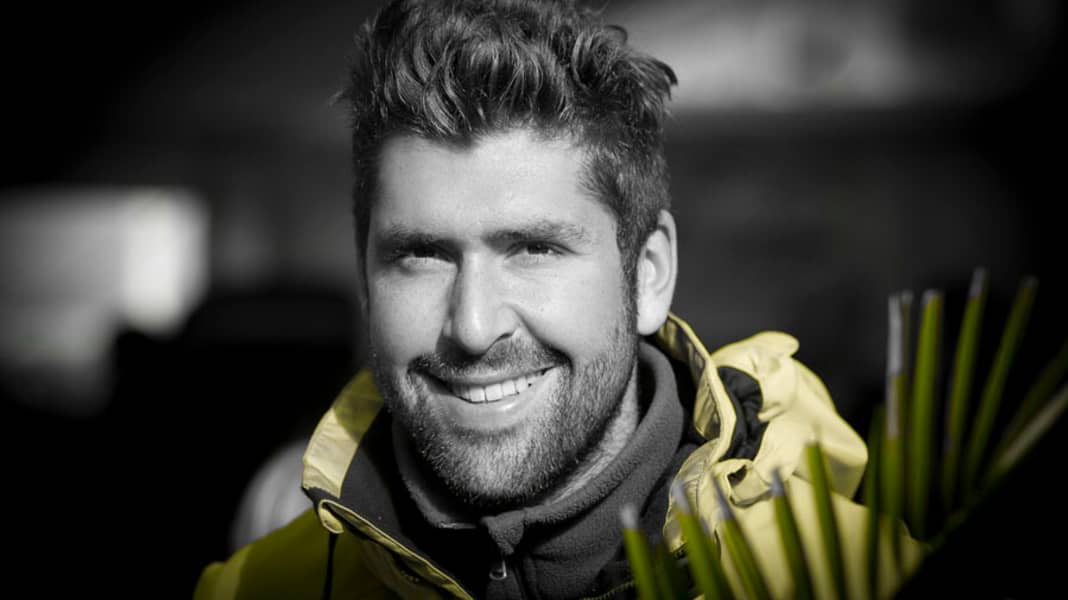
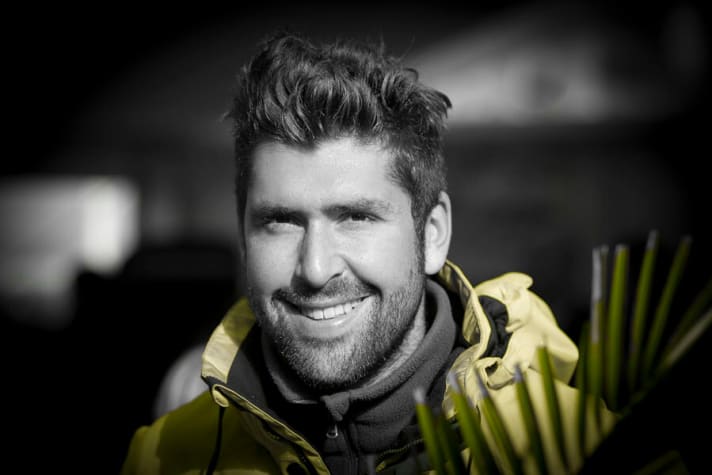
Instead of the French Revolution, Bismarck, Felgaufschwung and football, in future Vincent Langer's timetable will include board tuning, leg press, fin tests and sponsorship acquisition - northern Germany's pupils will have to wait indefinitely for "Teacher Langer" and make do with other history and sports teachers. Because in 2013 Vincent Langer wants to finally give it 100 per cent and become a full professional. Then the last voices that continue to dub him "Germany's most promising young talent" will probably fall silent.
Vincent, congratulations on your successes over the past year. There are people who would now refer to you as "Germany's most promising young talent"... Thank you, but I think I've grown out of it by now, even if I'm still one of the younger ones at 26. Maybe it's because there are big problems with young talent in the DWC. Even Gunnar Asmussen was advertised as a young rider when he was already over 30 and had been racing for ten years. I'm now often asked for advice, which shows me that most people have realised that I'm no longer the little Vinci of old.
The fact that we are coming together for this interview is in a way also due to a failure a few years ago. Because you actually had other plans until 2008, didn't you? That's right. From 2006 to 2008, I was in the DSV Olympic squad and had the goal of competing in the RS:X class at the Olympic Games. Unfortunately, I missed out on qualifying back then and then decided to go all out in formula racing and slalom.
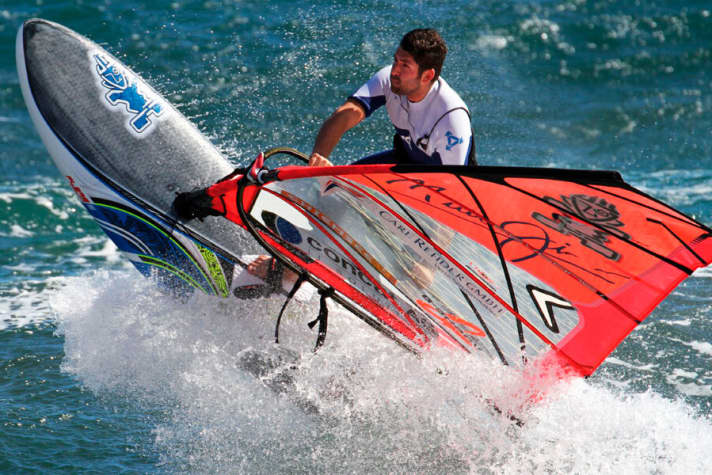
Why did it fail back then? The RS:X class starts with very little wind. This makes it very difficult for strong athletes. In addition, I only enjoyed the light wind racing to a limited extent - but that's the most important thing to be successful in your sport.
Your consistency in pursuing certain goals is great. But you couldn't come to terms with the optimum 70 kilos in the RS:X class. I am very consistent and give my all to my sport. The ideal weight for the RS:X board is around 70 to 75 kilos. However, this is a weight that was not feasible for my build. I starved myself down to 80 kilos with a diet plan and endurance sports and felt extremely uncomfortable with it. Nevertheless, I was far too heavy and had no chance. Last year, I ate my way up to 100 kilos because I thought that this weight was ideal for my current ambitions. That was also rubbish, and today I'm somewhere in the middle and I'm fine.
What body weight should a surfer weigh these days to be able to perform at their best in formula racing or slalom? Unfortunately, this is different, which is why it is difficult to compete at the top level in both disciplines. For the formaboard, 90 kilos is the golden weight. You start gliding early, but can keep up with the speed of the heavier guys when the wind picks up. It's a different story in the slalom. You should weigh around 100 kilos, because "fat is fast". Guys like Antoine Albeau or Dunki don't look like that for nothing.
Nevertheless, a bit of training and passion are probably also part of it... I think I have the advantage over other regatta surfers in that I really enjoy racing, even outside of regattas. I think it's really cool to fly around with a 12.0 sail at 20 knots at the limit, just like a session at seven knots at the lower planing limit. That's probably why I'm on the water more than anyone else with a formula or slalom board. I also do long training sessions on my own and am often out for several hours, for example to cross from Kiel to Eckernförde.
Did the DSV squad training perhaps even help you with regard to your Formula and slalom commitment? Definitely, especially in tactical training. I particularly benefit from this on the formaboard. But my coach also taught me timing and how to read the wind and waves, as well as a professional approach. There were days when we only practised starts all day, but that's paying off today. You see, racing isn't just about surfing, there's a lot more to it.
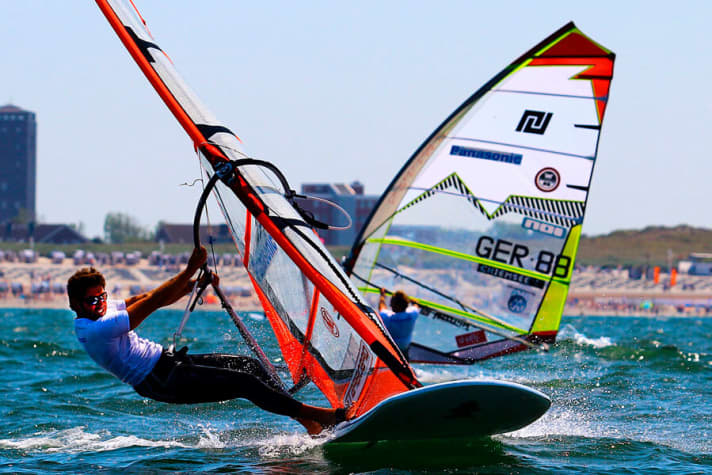
What role does the material play here? Do you even stand a chance without a mountain of the latest material? In the beginning, I competed with one board and one sail - of course I always had the wrong one, and I can sympathise with newcomers to racing. At a certain level, the material and the set-up are extremely important, especially at top international level! Small things like fins, footstrap position and sail trim can make the difference between winning and losing. But the most important thing is to be familiar with your equipment. Björn Dunkerbeck once said: "Never change a winning team" and he's right. I rode the same old board for four years until 2012. I had been familiarising myself with this board for a long time and, after a lot of trial and error, I finally found the perfect fin. Next season, however, I will be competing with a current board. My sponsor will be happy too.
Was there no stress from the sponsor, along the lines of: The new boards seem to be worse than the old ones. Starboard will probably not have been too happy about that. I believe that sometimes you have to assert yourself in the face of resistance. Ultimately, sponsors just want you to be successful. And if I have the feeling that I can perform better on an older board that I know perfectly, I should do everything I can to utilise this advantage. I always ride preparation competitions at the beginning of the season to compare the new equipment with the previous year's stuff. I only switch to the new equipment when I'm really convinced that I've made progress. It's a different story with the sails, because you can see them in every photo. I've always ridden the latest models. But I also need a few days to adjust them. That's why long training sessions and lots of training regattas are necessary to get the best out of big events.
In 2011, there was an event on Sylt where you first followed behind, then borrowed a sail from a rival brand and then drove everyone into the ground. Isn't that a slap in the face to the sponsor and a step too far? In the specific case on Sylt, everything was unnecessarily blown out of proportion. At the time, I had the OK from Point-7 to use other sails because I knew that mine weren't competitive at the time. I got the green light, that's the only reason I did it. I would never deliberately harm a sponsor.
Let's come back to your own consistency. Is it true, or just a rumour, that you have more or less put your wave material in the corner? That's not a rumour. I love riding small boards, practising freestyle manoeuvres and hitting the waves. In 2013, however, I decided to spend the entire season - no matter what the conditions - only on the water with slalom and forma equipment.
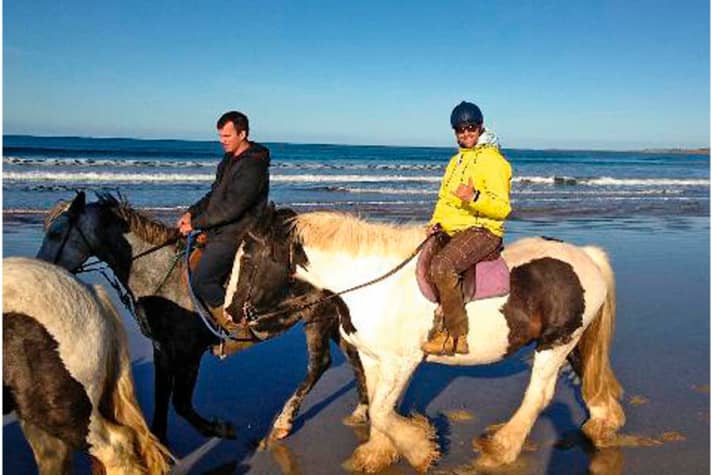
And when other guys are pulling the 4.0 sail out of the bag in Cabezo/Tenerife in seven force winds, are you travelling with Andrea Cucchi? When the others are having fun with small wave sails, I'm having fun with my small 6.2 slalom sail. Good training partners, such as Andrea Cucchi on Tenerife, are then on the water with me so that effective training is possible. And it's fun, even if many people don't believe it.
Our respect! Apparently your training partnership with Andrea Cucchi works. That wasn't always the case with other regatta riders. Do some drivers don't like to be shown their cards? The chemistry has to be right during training, because training partners are always friends too, otherwise the enjoyment comes up short. It's also important that the performance level is right. It doesn't do me much good to train with a surfer around whom I'm going round in circles. My training group - Andrea Cucchi in winter and some Danes in summer - works very well and is a lot of fun. For the German riders, this is limited to Fabian (Mattes, ed.) and Johannes Schade. Other German riders are less of an option, some of them are too determined for me.
Is it this doggedness that bothered you when you changed equipment on Sylt? Your competitor Bernd Flessner was really pissed off at the time and gave Dani Jacobsen, who had lent you his sail, a really good dressing down and threatened consequences. Or is that just part of competitive sport? At the time, things were extremely close between us, I was sawing away at his throne and Flessi was under a lot of pressure. Sometimes you say things that you shouldn't have said afterwards - I don't want to exclude myself from that. In the meantime, however, things have calmed down completely. I think he's now accepted that he can't be the eternal winner and that he can lose to me sometimes. He's actually a very nice and helpful guy.
Last year, you took the next step and rode impressively at the Sylt World Cup. Even though you didn't actually want to take part in the season highlight. World Cup Sylt? Sure, I had to be at the start as the DWC rankings leader, but I definitely wasn't looking forward to it. It was my 14th regatta of the season and at some point you run out of steam. In addition, I was under a lot of pressure at this regatta and had to perform successfully so that my sponsorship grant for 2013 could be extended to cover travelling expenses for foreign World Cups. So it's not always fun. In hindsight, I am of course extremely happy with my 13th place.
Away from your own involvement in regattas and towards supporting children and young people. That's where you get involved too. Unfortunately, there are very few people who really know anything about windsurfing regattas. That's why I trained the Schleswig-Holstein state squad in 2012. It wasn't about money, but about bringing in good young talent. In addition, a kids' camp is planned for the beginning of August 2013 in Heidkate with 30 children and young people. Unfortunately, very little is being done for our kids at the moment. The aim is to have fun on the water and learn a lot about wind, weather, sport and, of course, windsurfing. I'm sure the camp will be really great.
Rumour has it that you have been offered 50 euros in the DWC to hire a competitor's rig? My test work at Point-7 has taught me a lot about sails. So I get questions very often and I've actually been offered money before. But I'm happy to do it, even without money!
After your studies in Flensburg, you return to Kiel. But not to the city centre, to the hustle and bustle of life, but to a small town called Wendtorf. Why? A move to Wendtorf, right by the water, will definitely take place in April 2013. Then I'll be able to get to the water every day without having to move the car significantly. That will be great!
You probably don't get to know women there... No, but I've been single for two years and I'm happy as it is now! I can concentrate fully on windsurfing.
We wish you all the best for the coming season and hope that the right woman will be waiting for you one day!

